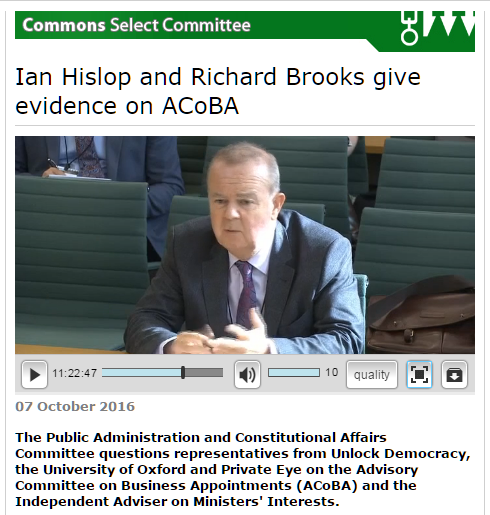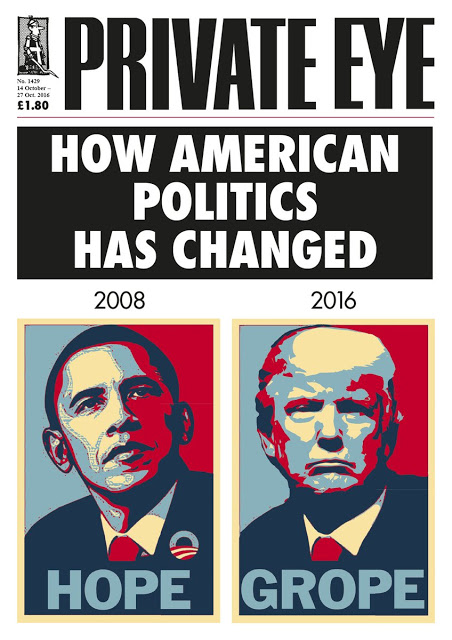Weekly Notes: legal news from ICLR – 17 October 2016
This week’s roundup of legal news and commentary includes judges speaking on history, law reform, courts modernisation and legal ethics; plus updates on Brexit, hate crime, social media and standards (or their absence) in public life. Brexit law Brexitigation: hearing proper commences On Thursday the much anticipated (as well as eagerly awaited) proceedings in the case… Continue reading
This week’s roundup of legal news and commentary includes judges speaking on history, law reform, courts modernisation and legal ethics; plus updates on Brexit, hate crime, social media and standards (or their absence) in public life.
Brexit law

Brexitigation: hearing proper commences
On Thursday the much anticipated (as well as eagerly awaited) proceedings in the case of Regina (Miller & anr) v Secretary of State for Exiting the European Union (Birnie & ors intervening) (CO/3809/2016; CO/3281/2016) commenced before the The Lord Chief Justice and Master of the Rolls and Lord Justice Sales. It appears to be a rolled up hearing of permission to apply plus the application or claim for a declaration itself, but I will be corrected if I’m wrong.We have covered the anticipation which took the form of both sides releasing (the government not without a certain amount of court-orderly prompting) their skeleton arguments, and a good deal of blogging and commentary about the case has been taking place since the initial directions hearing in July.
For an non-lawyers take on the case, artist Isobel Williams (whose fascinating images of Supreme Court hearings have appeared on this blog), describes her own experience of attending the hearing on her own blog, Drawing from an Uncomfortable Position.
Each morning, I wake up at the back of the sooty bone-strewn cave with an instinct that something bad has happened. Then I really wake up and remember Brexit.
But back to the overspill courtroom, where four large black monoliths are stacked against the wall behind the empty bench. What is their function? They remind me of the monoliths in Arthur C. Clarke’s 2001 but they don’t seem to be teaching us or transmitting anything. Presumably their alien creators don’t think we’ve reached a worthwhile stage of evolution.
Incidentally, she notes how she had to attend part of the hearing in an “overspill courtroom”, where they watched a live relay via closed circuit TV. If it can be relayed thus, would it not have been possible to broadcast the hearing live, or record it, like a parliamentary session? One for transparency in the future, I suggest.
Here is some of the recent legal commentary on the case:
- Jolyon Maugham in the FT: The Article 50 challenge shows parliament should have its say
- AL’s law The Brexit High Court case: actually Parliament already holds all the cards
In an unprecedented display of transparency and positively extravagant efficiency, the Judiciary website published ON THE DAY the entire transcript of the argument, which you can download here.
This makes top reading for Pannick-spotters and anyone (new pupils in particular) wanting to see and enjoy top class advocacy on a matter of constitutional importance, and no little complexity, reduced to celestial clarity. The bench, mind you, are no muffins. They will have mastered the issues pretty well anyway; but the benefit of this transparency is that the rest of us can attend, if not the court, a record of the hearing that has so many implications for the future of the British Isles.
Meanwhile, in Parliament…
the Justice Committee has opened an inquiry on the Implications of Brexit for the justice system. It is currently accepting written submissions; the deadline is Friday 11 November 2016.
The Committee is interested in views on the likely effects of Brexit on the processes of criminal and civil justice, as well as views on the financial effects on the legal sector and business and the economy more widely, and on steps which should be taken in the process of Brexit negotiations or by other means to minimise any adverse effects and enhance any positive effects.
Recent judges’ speeches
Sumption on History
Lord Sumption was a history don before he became a lawyer and still publishes very well received history books. In a lecture entitled The Historian as Judge (pdf) given at the Rolls Building earlier this month, he considered, among other things, “the value of the historical method to the work of a judge” and the advantages of studying history, or another non-law degree, before coming to the law.
This set a Twitter hare racing, with rivals camps promoting, on the one hand the benefits of reading law and uni and, on the other, the benefit of doing something else. The controversy (if such it was) was discussed on Legal Cheek (“Lord Sumption tells aspiring lawyers not to do law”, overstated the headline). (As someone who switched from history (Sumption’s pet subject) to law, I can honestly say I wish I had switched to English instead… in which case I should probably never have become a lawyer and someone else would be writing this roundup. But you can read Eng lit books, or indeed history, any time, whereas reading law in your spare time is something only a litigant in person is likely to do.)
There are lots of examples of great lawyers or judges who have come to it from other fields. But I imagine most law academics would support the idea of studying law at degree level, providing one didn’t regard it simply as a form of lectorial apprenticeship – as unfortunately so many do.
Lord Thomas CJ on Procedure
On the other hand, Lord Thomas of Cwmgiedd, the Lord Chief Justice, read law at Cambridge, before going on to the University of Chicago. He gave a speech last month, at the Singapore Academy of Law, on the subject of procedure. Cutting the Cloth to fit the Dispute: Steps towards Better Procedures across the Jurisdictions (pdf).
There’s plenty of history in this speech, too, but it’s about earlier and in some cases successful attempts to rationalise and simplify procedure. Lord Thomas calls for radical reform, arguing that nearly all proceedings, whether civil, family or administrative, and possible even criminal, involve the same basic series of procedural steps and a “single, generic code” could be applied to them all. With the advent of online courts and the use of digital filing technology, it should be possible to design a common IT system, using a unified code, but tailoring the process — allowing for greater or lesser disclosure and detail — according to the complexity (not the value) of the dispute.
He has a word of warning for the textbook writers:
although I would anticipate that a generic code would be clearly drafted, experience has shown that it may well be subject either to elucidation by commentary or to dispute which will then need to be resolved by judicial decision. This has happened to the Civil Procedure Rules, like the Rules of the Supreme Court before them; they became encrusted with case law and lengthy explanations rather than being subject to revision to keep the procedural code simple and easy to use. These defects must be avoided for the future, disappointing though that may be to academics, writers of textbooks and judges. We must not have any commentaries as the code must be drafted so that they will not be needed. Judicial decisions on a disputed text should only be used as a basis to correct the code and thereafter be discarded.
So goodbye White Book? I fear not. Having seen the judiciary stir up controversy over Archbold as the standard criminal bible, I hardly think Sweet & Maxwell, aka Thomson Reuters are going to see another of their lucrative annual subs go west (law).
Lady Hale on Law Reform
Baroness Hale of Richmond, the third in our trio of recent Law Lord speechmakers, not only read law at university but went on to teach it, as well as becoming a barrister. Her speech, Legislation or judicial law reform: where should judges fear to tread? (pdf), given at the Society of Legal Scholars Conference 2016, concerned the perennial question whether the law should ideally be reformed by the courts, judgment by judgment, and promulgated via the law reports, or by Parliament enacting suitable legislation, typically following an investigation, consultation and report by the Law Commission.
Lady Hale discussed the matter by reference to some of the cases she had herself been involved in. An important speech that all students should read.
The fact that so many important changes in the law have been made by the courts extending and adapting the common law – or correcting (as in Jogee’s case) a wrong turning — is, if nothing else, a justification for the continued value of law reporting. But there are less selfish reasons for approving it, not the least of them being the frightful mess Parliament can make of a piece of legislation when it puts its hopelessly divided mind to it (despite all the best efforts of the parliamentary drafters, let me emphasise!).
Ryder on the futuristic Bar
Giving the keynote address at the Bar and Young Bar Conference this weekend, Sir Ernest Ryder, Senior President of Tribunals spoke about Raising the Bar: Innovation and global opportunity for a forward thinking profession (pdf). Beginning (in Sumption-approved manner) with a slice of history, dating back to 1873 when Gladstone was PM, Girton College admitted the first women undergraduates, Chipping Norton witnessed riots, and the first of the Judicature Acts was passed, Sir Ernest went on to develop a thread about “the most ambitious period of change” and reform in the law since the aforementioned Judicature Acts. He urged the Bar to prepare for
an environment where paper-based processes are to digital processes and cloud-based systems what the horse drawn carriage is to space travel.”
Baker J on Matters of life and death
Finally, in this roundup of judges’ speeches, would like to mention Mr Justice Baker, who sits in the Court of Protection, speaking in Oxford this week, on A Matter of Life and Death (pdf) discussing, as one practitioner put it, the legal, clinical & ethical aspects of making best interests decisions about withdrawing nutrition & hydration leading to death.
Transparency
Court of Protection
The Court of Protection has been in the news this week owing, yet again, to the inaccurate way it is reported. As noted by the Transparency Project, The Court of Protection’s not so secret anymore, but the press don’t seem to have noticed. Several newspapers reported luridly that a 71-year-old granny had been sent to jail for disobeying a court order requiring her to assist in the repatriation from Portugal of an elderly man, referred to as MM, whose best interests, the court had ruled, would be served by him living in a residential care home in this country, in the South West.
The newspapers did not refer to the judgment, which was available on BAILII, though its publication there was presumably what prompted their coverage of the story; but they happily recycled the stale trope that the court was “secretive” even though the judgment (and indeed hearing, as it was a contempt application) was in open court.
While we’re on the subject of the Transparency Project, with which I’m proud to be associated, CONGRATULATIONS ARE DUE to two of its members, who this week won awards:
- Lucy Reed, aka @Familoo of Pink Tape blog fame, who won Barrister of the Year in the Bristol Law Society Awards 2016 this week (and her chambers, St John’s Chambers, won Chambers of the Year).
- Louise Tickle / @louisetickle , journalist (mainly for the Guardian) who won the Bar Council’s Legal Reporting awards 2016 in the print online category, jointly with Carole Binham.
Hate Crime
Cross-party report on anti-semitism
The Home Affairs Committee called on all political leaders to tackle the growing prevalence of this pernicious form of hate in its report, published during Hate Crime Awareness week, entitled Antisemitism in the UK. The Committee expressed particular concern at the shocking evidence it received of the volume and viciousness of antisemitism online, including countless examples directed at Parliamentarians. It took Twitter to task for allowing itself, despite all the technological tools at its disposal, to become an “inert host for vast swathes of antisemitic hate speech and abuse”.
It was also critical of the Labour party and its leader Jeremy Corbyn for failing to tackle the issue within the party and among its activists. It regarded the Chakrabarti Report (pdf) as
ultimately compromised by its failure to deliver a comprehensive set of recommendations, to provide a definition of antisemitism, or to suggest effective ways of dealing with antisemitic incidents”.
The cross-party committee also criticised National Union of Students (NUS) President Malia Bouattia for failing to take the issue sufficiently seriously on university campuses.
You can read the full report here.
Social media
New CPS guidelines
The Crown Prosecution Service have issued updated guidelines on prosecutions for offences committed via social media, and have launched a “hate crime” consultation. The guidance, published 10 October, will be used to inform decisions on whether criminal charges should be pursued. Released during Hate Crime Awareness Week, it has also been updated in order to help prosecutors identify and effectively prosecute hate crime on social media.
Under the guidelines, there are four categories of communications:
Category 1: communications which may constitute credible threats of violence or damage to property;
Category 2: communications which specifically target an individual and which may constitute harassment, stalking, controlling or coercive behaviour, revenge porn, an offence under the Sexual Offences Act 2003 or blackmail;
Category 3: communications which may amount to a breach of a court order;
Category 4: communications which may be considered grossly offensive, indecent, obscene or false.
There is a helpful summary of the guidelines on Inforrm’s blog, from which I have derived some of the above information: see Social media: anti-social, criminal but also tolerable – Amber Melville-Brown.
The BBC reported that the Director of Public Prosecutions, Alison Saunders, told BBC Radio 4’s Today programme:
“The internet’s not an anonymous place where people can post without any consequences. People should think about their own conduct.
“If you are grossly abusive to people, if you are bullying or harassing people online, then we will prosecute in the same way as if you did it offline.”
However, Ms Saunders said context will be an important factor in decisions – for example “if you’re offensive, the legislation would say you have to be grossly offensive, and that’s quite a high test”.
The Out-Law blog from Pinsent Masons also commented on the new guidelines, alerting readers to the fact that Use of ‘derogatory hashtags’ on social media might lead to prosecution.
Administration
Public service in the private eye
The increasing extent to which senior civil servants and politicians, on retiring (sometimes early) from public life, are then to be found occupying well-padded seats in the boardrooms of industry shortly thereafter, was the subject of a Special Report in Private Eye last month: see issue 1426 at pages 19 to 24. This week, one of the report’s authors, Richard Brooks, together with Ian Hislop, editor of Private Eye, appeared before the parliamentary Public Administration and Constitutional Affairs Committee, to answer questions about the Advisory Committee on Business Appointments (ACoBA). That was the body set up in the wake of Lord Nolan’s report on Standards in Public Life in the early 1990s, to act as gatekeeper, or gamekeeper, to scrutinise such appointments. The Eye seem to think it’s been a complete flop and, in their report’s words,
less a gatekeeper and more a commissionaire standing by the spinning door to ensure no one got stuck on their way from the public to private sphere”.
The “number crunching” is stark: Since 2010, 137 ministers have applied for 394 jobs in the private sector for which they have sought clearance from ACoBa. Not a single one of them has been refused. Likewise, former civil servants have applied for 367 jobs for which, yet again, not a single one has been refused clearance by ACoBa.
As you’d expect, Hislop, who this year celebrates 30 years as editor of the Eye, does not refrain from speaking truth to whatever power a Commons committee really has. That was on the Tuesday. A couple of days later he was recording another edition of Have I Got News For You, broadcast on Friday. And meanwhile there’s the little thing of editing a bestselling magazine which, this week, had one of its best covers ever.
That’s it for now. Our thanks to all who flagged up stories, via their blogs (which we always try to acknowledge) and via Twitter (where useful tweets are retweeted).
This post was written by Paul Magrath, Head of Product Development and Online Content at ICLR, who also tweets as @maggotlaw. It does not necessarily represent the opinions of ICLR as an organisation. Comments welcome on Twitter @TheICLR.
Sign up now for weekly email alerts from this blog. Just put your email address into the box on the left.

